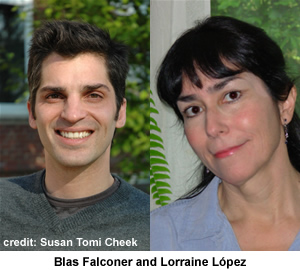Diversity Within Diversity
With a new collection of essays, editors Blas Falconer and Lorraine M. López explore the varied faces of Latino identity and literature
A search for the word “Latino” among Amazon.com’s literature and fiction offerings returns more than a thousand titles, including such mainstream fare as The Norton Anthology of Latino Literature and Chicken Soup for the Latino Soul. Clearly, “Latino” is a widely accepted cultural designation, and the word is embraced by most of the people to whom it is applied. Yet, as Blas Falconer and Lorraine López point out in their introduction to The Other Latin@: Writing Against a Singular Identity, Latino is a catch-all term, “an imaginary space for filing diverse people in a singular slot.” Latinos in the United States have roots in many countries, from Cuba to Colombia, and come from an array of racial, ethnic, and socio-economic backgrounds. The Other Latin@ brings together twenty-one writers to examine the multifaceted nature of Latino identity and what that identity means to their lives and their work.
Although the collection’s overarching concern is the diverse quality of contemporary Latino writing, most of the essays in The Other Latin@ are deeply personal, and they offer a fascinating exploration of the ways that identity is imposed, chosen, discovered, and expressed over the course of an individual’s life. The unlikely twists and turns of the process are nowhere more clear than in “The Long Road Home” by poet Lisa D. Chávez. The child of a Chicano father and an Anglo mother, Chávez spent her childhood in Alaska, where there were few Latinos. Her dark skin meant that she was often mistaken for one of the Athabascan or Yupik Natives, who, she says, accepted her “unconditionally and easily,” and helped her shape an identity for herself “in the face of a profound white racism.” After relocating to Arizona as a graduate student, she felt “odd, inauthentic, dismissed” in encounters with other Latinos because she could not speak Spanish. Even so, and despite the fact that her work was largely informed by her adopted identification with the Native experience, her last name got her pigeonholed in the literary world as a Latina writer. She eventually discovered that she actually has Native American forebears among the Puebloan people of New Mexico, where she now makes her home and where, she writes, “all the parts of my ancestry—Native, Latino, Anglo—have shaped an entire state.”
 Coeditor Lorraine López, a novelist who teaches in the M.F.A. program at Vanderbilt University in Nashville, also has roots in New Mexico and grew up in a largely Latino community in Los Angeles, but her search for identity was, in some ways, as difficult as Chávez’s. In “When We Were Spanish,” López recounts her mother’s determination to distinguish her “Spanish” family, whose presence in New Mexico could be traced back to the seventeenth century, from Mexican Americans or Chicanos of more recent immigrant stock. López had such a strong sense of ethnic identity as a child that she felt “a confluence of repulsion and pity” toward whites, and thought of them as somehow less “real” than Latinos. As she got older, however, she began to see the power whites enjoyed and recalls that with “my height, fair skin, and European features, I found that I could pass. And so I tried to do this, to be real and not-so-real, whichever was which and whenever it suited me.” That “cultural ambivalence,” as she calls it, brought feelings of “undeserved privilege” but also criticism—from Latinos and non-Latinos—for not being Latina enough.
Coeditor Lorraine López, a novelist who teaches in the M.F.A. program at Vanderbilt University in Nashville, also has roots in New Mexico and grew up in a largely Latino community in Los Angeles, but her search for identity was, in some ways, as difficult as Chávez’s. In “When We Were Spanish,” López recounts her mother’s determination to distinguish her “Spanish” family, whose presence in New Mexico could be traced back to the seventeenth century, from Mexican Americans or Chicanos of more recent immigrant stock. López had such a strong sense of ethnic identity as a child that she felt “a confluence of repulsion and pity” toward whites, and thought of them as somehow less “real” than Latinos. As she got older, however, she began to see the power whites enjoyed and recalls that with “my height, fair skin, and European features, I found that I could pass. And so I tried to do this, to be real and not-so-real, whichever was which and whenever it suited me.” That “cultural ambivalence,” as she calls it, brought feelings of “undeserved privilege” but also criticism—from Latinos and non-Latinos—for not being Latina enough.
For some readers, the issues discussed in The Other Latin@—in particular, the passionate debates over language—may be puzzling. For example, there are numerous references to the dispute over “Hispanic,” a term that is used freely in mainstream American culture but is strongly rejected by some Latinos. But the central questions addressed in these essays—Who am I? Whom do I speak for? Who is my audience?—are critical to every writer; indeed, to anyone who seeks a place within the wider society. Coeditor Blas Falconer is an American-raised Puerto Rican who teaches in the creative-writing program at Austin Peay State University in Clarksville. His poems, he writes in “A Meditation on the Experience and Aesthetics of the Other Rican,” will “always reflect who I am and where I’ve come from—wherever that may be.” It’s a sentiment with which most artists, regardless of their origins, would agree.
Blas Falconer, coeditor of The Other Latin@, will read from his work on October 24 at 7 p.m. at the Hodges Library on the University of Tennessee campus in Knoxville.


